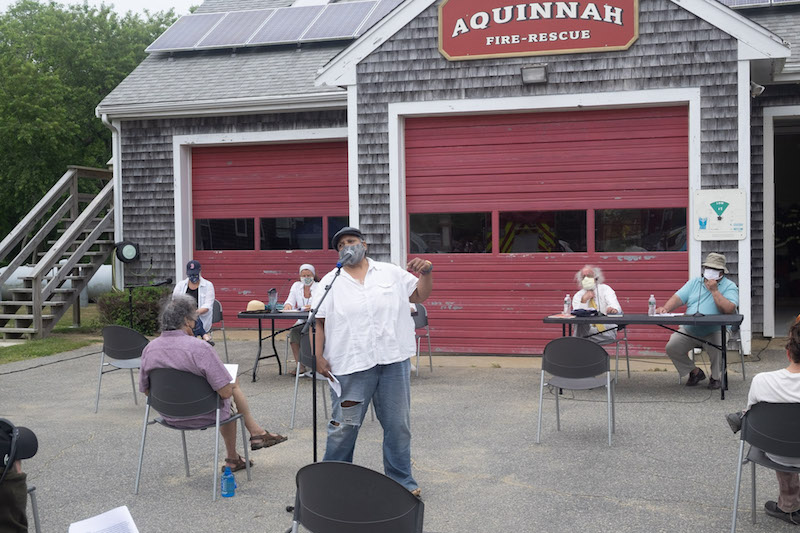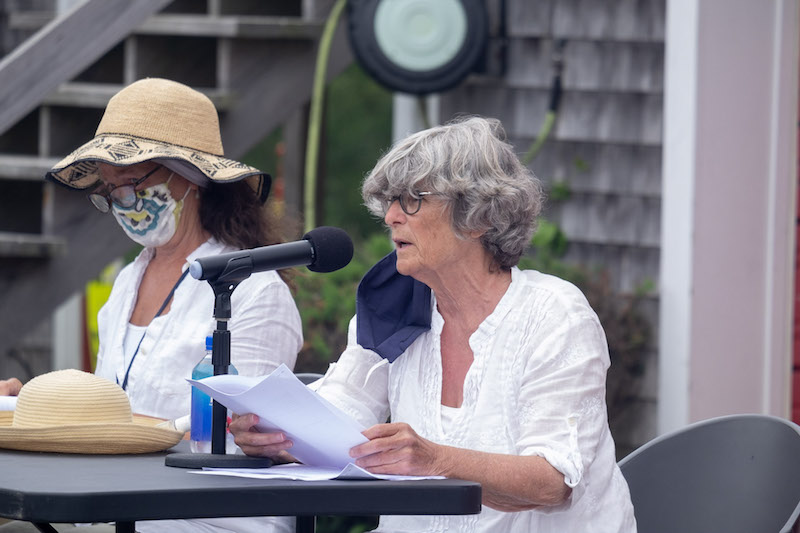Aquinnah voters zipped through their annual town meeting Tuesday afternoon, approving every article on the warrant in just over an hour.
The lone flashpoint of the day came over legal spending, but in the end a transfer of $125,000 from the stabilization fund to cover past expenses for litigation with the Wampanoag tribe passed by a wide margin.
The expenses were for special counsel in the ongoing litigation with the tribe over its planned casino project in town.
Held in the parking lot outside the town fire station with chairs set out at six-foot intervals on a foggy, breezy day, the meeting saw a healthy turnout of 55 voters, with 35 needed for a quorum.
Longtime town official Sarah Thulin was elected temporary moderator to take the place of moderator Michael Hebert, who was unable to attend.
There were 18 articles on the warrant, cut back this year to only essential spending items. Voters swiftly approved a $5.2 million operating budget for fiscal year 2021 that includes no cost of living increases for town employees, and easily backed a series of spending initiatives for ongoing restoration of the Gay Head Light and capital improvements at the Aquinnah Circle.
Voters also approved their share of the funding for the new Dukes County emergency communications tower and the dust collection system in building trades at the regional high school.

A $46,000 project to dredge and make other improvements at the West Basin won approval. Aquinnah harbor master Brian (Chip) Vanderhoop said he hopes to use some of the funds to build a harbor master and shellfish constable shack as well.
But the fast-moving meeting bogged down when the transfer from the stabilization fund for legal spending came up.
Carol Vandal, a member of the Wampanoag tribe, questioned the wisdom of the long-running legal battle between the town and the Wampanoag Tribe of Gay Head (Aquinnah) over the plans for a class II gaming facility on tribal land off State Road.
“Suing the tribe is ridiculous. We need to come to the table and talk this out,” Ms. Vandal said. “I am not for the casino, I don’t think it should be built here. But I think we have a right to live, a right to stop being oppressed by the people who are now staying on our original lands.”
But Juli Vanderhoop, chairman of the selectmen and also a member of the tribe, staunchly defended the town’s actions, saying that all attempts to communicate with the tribe had gone unanswered. “I cannot say how many letters — because it is many — that we have tried to ask questions or invite open discussions. None have been answered, not one reply,” Ms. Vanderhoop said.
“Why . . . is my question, as I sit in this position on the select board as a tribal member and try to give the balance and keep a historic position going, does my tribe and council not want to speak with us here in this community.”

Ms. Vanderhoop pointed to the lapsed public safety agreement between the town and tribe that has languished for eight years. “These things are important,” she said. “I don’t think that any of the boards are against our tribe . . . and to this day I believe that the majority of people here will help. But we need to answer questions and allow a verbal communication to begin . . . I’m worried about the kids in this community, the elders in this community and the health of this community. We can do better if we communicate. This legal bill is about answering questions and working together to find something that works. I want the tribe to be able to develop in a way that gives us all safety and protects us in the future.”
Ms. Vandal pressed further, and was adamant that the town should do to do more. “Come to a meeting and bring it up,” she said.
But selectman Jim Newman backed up Ms. Vanderhoop. “With all due respect, Ron [town counsel Ron Rappaport] and I were able to meet with the tribe once, we asked for subsequent meetings and that was refused,” Mr. Newman said. “And that’s probably 18 months ago. Since then all of our agreements were canceled, there’s been no suggestion of cooperation or discussion and the board at no time was opposed to the casino. We just wanted to find out what we could do to work together and how we can provide public safety measures, and that was totally rejected. So, to say we’re not meeting at meetings — there have been no meetings because they haven’t been permitted.”
The article needed a two-thirds majority to pass and did, 47-5.








Comments (1)
Comments
Comment policy »